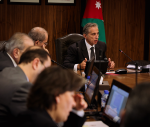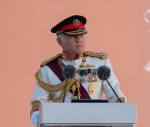You are here
Jordan in talks with IMF over new development programme
By Mohammad Ghazal - May 06,2019 - Last updated at May 06,2019
AMMAN — Jordan is in discussions with the International Monetary Fund (IMF) to start a new programme for development purposes, the government announced on Sunday.
“We have requested signing a new programme with the IMF that will mainly focus on development. The new programme does not entail imposing new taxes or fees at all,” Minister of State for Media Affairs Jumana Ghunaimat told The Jordan Times on Sunday following a media gathering.
The minister added that Jordan asked the IMF to extend the current $700-million Extended Fund Facility (EFF) for six more months until a decision is reached regarding the new programme with the fund.
Jordan and the IMF signed the 36-month programme in 2016, under which the two sides agreed on six conditions that aim at reducing public debt to safe levels and stimulating the economy.
The Income Tax Law, which went into effect at the beginning of this year, is part of fiscal reforms under the programme.
Earlier this year, an IMF mission visited the Kingdom to conduct the second review of the national economy’s performance under the EFF and, after its completion of the review, it issued a statement concluding that its outlook “brings renewed momentum despite persistent challenges”.
The IMF mission to the Kingdom, led by Martin Cerisola, was in Amman from January 27 to February 7, during which it discussed the country’s recent economic developments, as well as the government’s economic policies under Jordan’s reform programme.
At the conclusion of the visit, Cerisola issued a statement, attributing the IMF’s outlook for the country’s economy to the recent reopening of the border with Iraq and associated trade and investment agreements, the extension and broadening of the agreement with the EU for relaxed rules of origin for Jordanian products as well as other efforts to lower the cost of generating energy.
These measures “bode well for a steady recovery in investment, exports, competitiveness and growth”, according to the IMF. However, challenges still remain, particularly from tighter and more volatile global financing conditions and elevated vulnerabilities, the IMF statement noted.
The Kingdom’s public debt reached JD28.3 billion by the end of 2018, split between JD25 billion of central government debt (the budget) and JD3.3 billion as a government guaranteed loan, according to official figures.
Related Articles
AMMAN — Jordan and the International Monetary Fund (IMF) will begin next week negotiations over a four-year fund-supported programme, Financ
AMMAN — The International Monetary Fund (IMF) has completed its second review of Jordan's economy, concluding that its outlook “brings renew
AMMAN — International Monetary Fund (IMF) mission on Sunday started its visit to the Kingdom as part of efforts to support and follow up on















